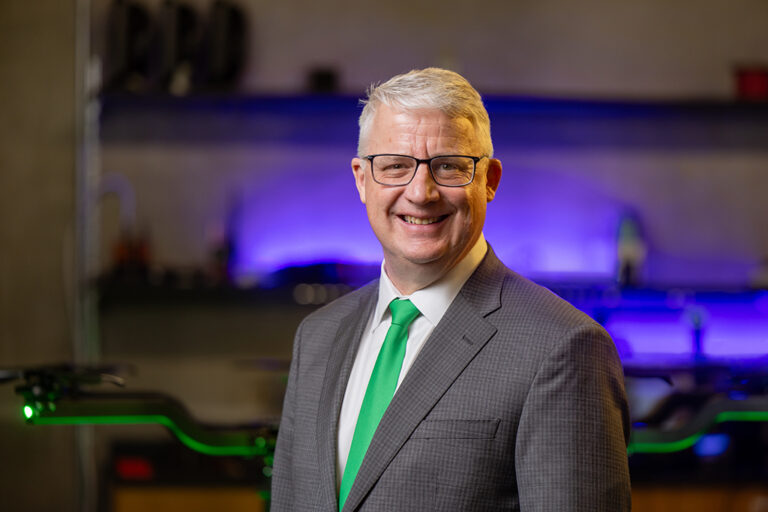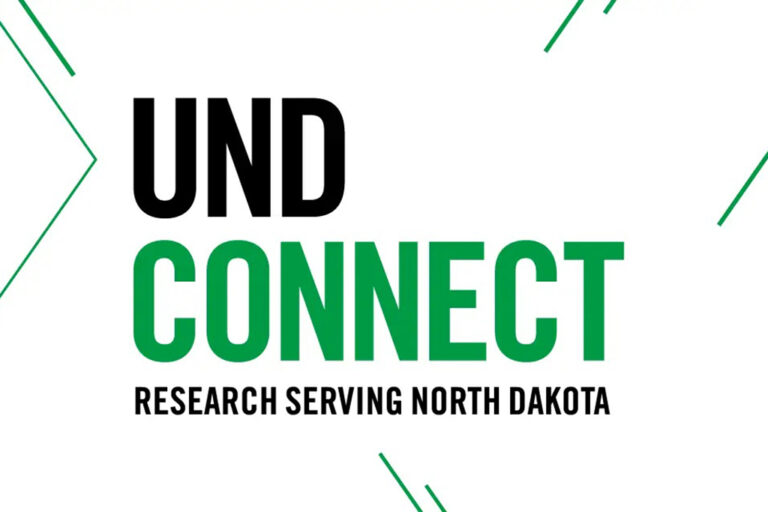‘Clear and concise’ in minutes flat
UND’s Three Minute Thesis competition rewards gift of gab, but takes a village to perfect

North Dakota is No. 1 in the nation for honey production and No. 2 in oil production, but also ranks third in incidents of Parkinson’s disease.
Within three minutes of that opening statement, Ph.D. student Rabie Fadil made his case for a new type of medical device and secured a first-place finish at UND’s 2022 Three Minute Thesis competition, to boot.
Fadil, a biomedical engineering student, topped a diverse field of graduate students and research topics to win a $500 scholarship prize with his presentation, “Preventing falls in Parkinson’s disease.”
Through his talk, Fadil detailed the conditions contributing to fall risks among those living with the brain disorder, and how a device that he and fellow researchers are developing can help people with Parkinson’s know when they might be at a higher risk for a falling incident.
Fadil’s idea is to create something akin to a common bathroom scale that uses multiple body measurements and a predictive algorithm to determine someone’s risk of falling. Ideally, this information can help everyday people and doctors alike in living with and addressing the disease.
Using straightforward graphics and a streamlined spiel, Fadil impressed judges through two rounds of competition among 14 other competitors. This spring, he’ll take part in the regional competition hosted by the Western Association of Graduate Schools in March.
“To me, it’s a prestigious title, and it’s something that’s going to add a lot to my life,” Fadil told UND Today shortly after his win. “Earning first place is something I’m really proud of, and it was very challenging for me. I’m thankful to everyone who helped me in getting that title.”

Competing from near and far
This year’s “3MT” competition, a concept originally conceived in 2008 at the University of Queensland, Australia, was the sixth for UND’s School of Graduate Studies. Contestants are supposed to clearly and concisely explain their research in a three-minute window, using only one PowerPoint slide.
Joining Fadil on the podium were Ph.D. students Maharshi Dey, from mechanical engineering, and Vida Atashi, from civil engineering, in second and third place, respectively. All three received scholarship awards, with each being presented on an oversized check after the final round.

The larger-than-life checks were a welcome return for the competition, as it was the first time since the pandemic’s outset that 3MT could be held in-person. Chris Nelson, associate dean of UND’s School of Graduate Studies, was glad to once again play emcee throughout the day (with some drumroll help from the audience).
“I think everyone involved was happy to be able to move to an in-person format, given the emphasis on communication to an audience, which, even given rapid advances in technology accelerated by the pandemic, is still perhaps best experienced in person,” Nelson said. “At the same time, the switch to a virtual format last year showed us that it is possible for our remote students to successfully compete in 3MT.”
In the Memorial Union ballroom, two distance competitors presented to judges via video recording, and one of those entries advanced to Wednesday afternoon’s final round. Jessica Passini, a master’s student in public health, connected with the competition from Alaska to talk about her work studying connections between mental distress and heart attacks among military veterans.
UND is considering a preliminary round exclusively for remote students to present live, given advances in the reliability of video conferencing, Nelson said. Such a format would give all competitors a similar experience with similar value, he added.
Three months for three minutes
Fadil, who competed live and in-person, lauded 3MT as a learning opportunity when asked about his motivations to enter the event.
“It’s a great opportunity for me to improve my communication skills,” said Fadil, who came to UND from Morocco, an Arabic-speaking country. “Whether you’re in academia or industry, you always have to communicate, no matter the role. Sending that message, in a clear way, is something that’s very important.”
According to Nelson, employers and organizations in just about every industry have “communication skills” at the top of their needs for job candidates.
Speaking to anyone involved with 3MT reveals that what ends up as a three-minute talk is typically the result of at least three months of work, replete with faculty-led training sessions, drafts, re-drafts and last-minute adjustments to hopefully leave a lasting impression.

Soojung Kim, associate professor of communication, watched Fadil and all of Wednesday’s competitors from the crowd feeling like a “proud mom,” given her role as faculty training lead for 3MT. After calls for nominations go to campus departments in August to draw students, Kim spends the rest of the year leading sessions for students to workshop their ideas into viable three-minute presentations.
With the help of Graduate School staff, she also leads a small army of volunteer faculty, staff and administrators who offer feedback, advice and constructive criticism across three weeks’ worth of sessions from October through December.
All entered students are required to attend the first session, but Kim has found that top-placing students (including Fadil) take advantage of all of the training opportunities available.
“What I really love is that every one of these students is doing an important thing in their own research field,” Kim said. “When they start talking about what they do, their eyes sparkle. And I want them to be a storyteller. It doesn’t matter whether you’re a communication student or not, you always have to be a storyteller about your own research.
“I tend to focus on a bigger picture. ‘Why are you so passionate about this? Why is it an important thing to do? Let’s make it relevant to our audience.’”

Motivating, rewarding results
With the help of a clever infographic, Fadil showed that regardless of the variety of factors causing falls among people with Parkinson’s, as well as the elderly, the consequences tend to cascade. Injuries and resulting financial hardship can quickly take away peoples’ independence, thereby damaging quality of life.
In rural tracts of the country where care can be far away, such as North Dakota, that independence is even more valuable, Fadil said.
Citing the research he has done working with Parkinson’s patients at Sanford clinics in Fargo, Fadil told his audience of judges and spectators that he wants to deliver what is currently a complex and expensive monitoring process to an inexpensive, at-home device – a product that can evaluate factors such as balance, heart rhythm, respiration and leg muscle activity in one place and provide guidance that can ideally prevent falls and injuries.
Nearly everything that Fadil presented at this year’s 3MT came as a result of attending the monthly training sessions, and it was the most important thing that helped him earn first place, he remarked.
“I didn’t miss a single one, and the comments from people such as Dr. Kim and all of the other trainers were very beneficial,” Fadil continued. “They helped me refine my speech, and the idea of my slide came from those sessions. I learned a lot.”
On Wednesday afternoon, shortly after hoisting the $500 check for a grip-and-grin photo, Fadil added his 3MT placement to his CV. With his eyes set on a career in academia, he considers the competition as a starting point for elevating his communication skillset.
Fadil said, “It’s going to keep me motivated and learning every day, so when the day comes and I’m a professor, I’ll be ready to provide a better education for future students.”



